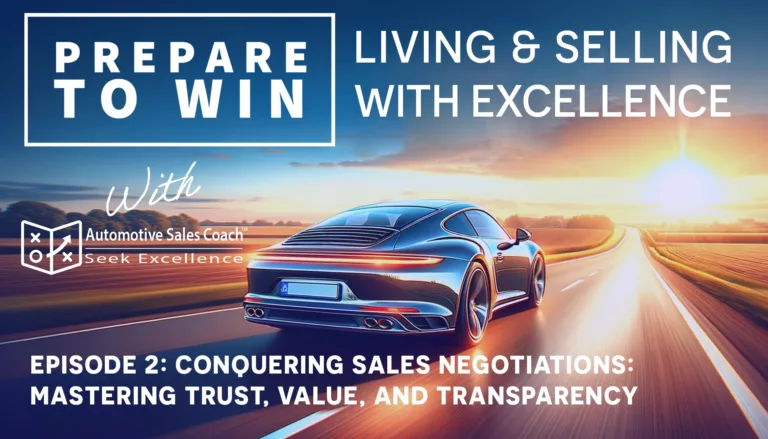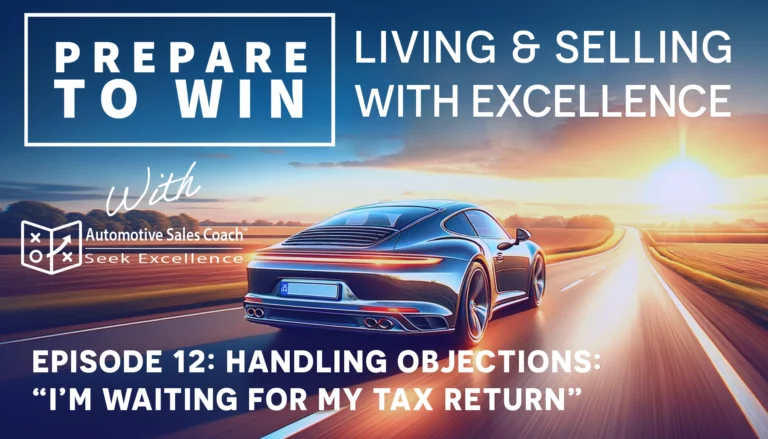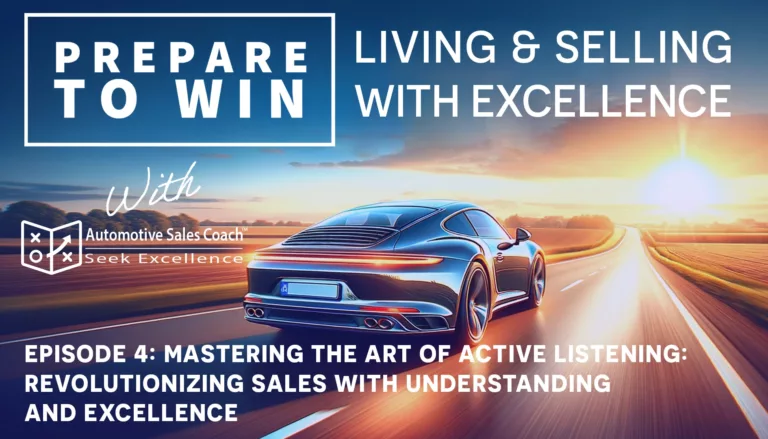Welcome to the latest episode of ‘Prepare To Win’. Today, we’re diving into an exciting and crucial topic for all you sales enthusiasts – the difference between belief and police management in sales. This episode is packed with insights that are key to understanding how to lead a sales team effectively.
Have you ever wondered what makes a great leader in the sales world? It’s not just about giving orders. It’s about inspiring and guiding your team to believe in what they’re doing. In this episode, we talk about why it’s important for a team to truly believe in their sales process and how this belief drives them to achieve great results.
But, it’s not all about belief. Sometimes, being a good leader means knowing when to step in and make sure everyone is following the rules. This is what we call police management. It’s all about finding the right balance between guiding your team with belief and keeping them on track with clear rules.
This episode is perfect for sales managers, team leaders, or anyone who wants to learn how to lead a sales team to success. You’ll learn about the power of belief in driving action, and why it’s so important to build a strong belief in your team.
So, whether you’re leading a sales team or just starting out in sales, this episode has something for everyone. Tune in to discover how to transform your team’s potential into outstanding performance, all through the power of belief and the right management style.
Remember, great sales results start with great leadership. Let’s learn and grow together in this journey of mastering the art of sales leadership. Let’s prepare to win, every single day!
David Lowe: 0:00
Welcome to All right, yeah, we’re starting just like that. Listen, we have a lot of fun. If you’re not having fun, you’re not living with joy pieces, satisfaction and I’m doing it right. So, listen, welcome to prepare to win. Today we’re gonna talk about Belief versus police management. You’re gonna want to hear this episode. Stay tuned.
Grace Lupoi: 0:34
Hi guys, Grace Lupoi , and I’m here with David Lowe, the automotive sales coach, and we are talking about police versus belief management right, and we have to do both sometimes and both are really important. Let’s talk a little bit about that.
David Lowe: 0:45
Okay. So it’s fantastic that just this week, we’re doing coaching, with excellent boot camps, and our training facility has been fantastic, and we’re really we’re talking about Sales managers and there’s not a whole lot of training for sales managers. How do you manage and coach and lead with excellence? It’s a great time together, and if we do a lot of that and there’s more to come I believe leadership is really to key to getting the results that we want in life. Now, can I tell you this anyone can be a leader. Right, you know what a leader is someone who does what they’re supposed to do Without being asked, isn’t that true? That’s right. A follower is somebody who has to be constantly Pushed to do what they’re supposed to do in life. Being a leader is taking personal Responsibility for yourself and taking action when nobody’s watching, knowing you work for an audience of one. Right, being a follower is constantly sitting around waiting to be told what to do next. So, in truth, what we all can choose to be a leader. Right Now we’re gonna talk a little bit about the actual role of a leader or management, right? So if you’re in the role, and my job is to make sure that the Businesses game plan is executed right? How do I get that done, especially when not all my team members are leaders yet, right? So, sales managers, if I’m talking to you, if this is, if you’re in a car dealership and you’re a sales manager, we’d like to change your name to sales coach but say, say you’re a sales manager and you’re in charge of helping people fulfill the dealerships Playbook, operate and execute the dealerships game plan, how do you get them to do it? I was get that set. Now, if you’re a parent and you’re like, hey, how do I get my kids to listen? Right, it’s the same thing. So, when we are in charge of someone else, we’re responsible for someone else’s actions, right. When we become responsible, we’re like their manager, and I’d like again to move that to coach. So, as your parent, I’m your coach, right? And as your sales manager, I’m your coach. And as your coach, I have authority, don’t I? You do have authority in your life, and so I’m gonna use that authority to help you be better than I am. Right, I’m gonna use that authority to protect you and to build you. That’s what it’s for. So, as a parent, as a sales manager, we’re gonna call you coaches from here on out. If you’re a coach in life or a coach in the dealership. We’re gonna talk about how to get people to do so. We know that people many times don’t do what they’re supposed to do because they didn’t know they’re supposed to do it. Right. Our last episode we talked about being unconsciously incompetent. You don’t know what you don’t know. We call it ignorance and, by the way, we both say we’re better today than we were a year ago.
Grace Lupoi: 3:50
I agree with you there.
David Lowe: 3:51
So a year ago I didn’t know what I didn’t know, and right now, I believe, a year from now, we’ll be even better than we are today, would you?
Grace Lupoi: 3:58
Absolutely.
David Lowe: 3:59
So if we would say that that means there’s things that we don’t know or can’t do right now, because if we’re gonna be better a year from now, that means we’re not as good today as we will be right, I think we can all say that there’s an area of ignorance in our life and I gotta be honest with you. I’m 58 years old and I spent a lot of time reading and training myself and developing myself, and I was trying to expand my mind and I’ve run across those aha moments all the time, like I should have done. That it’s fantastic. It doesn’t make me feel bad, it’s like wow, it’s awesome, there’s more for me to learn and do right. So that ignorance is why people sometimes don’t do what they should do right. Maybe you’re not taking care of yourself because you didn’t know how to take care of yourself right. And then there’s, of course, weakness. People don’t do what they’re supposed to do, not because they didn’t know they were supposed to do it, but because they’re weak. Their skill level is weak. They’re maybe-. It’s a confidence level, confidence level brings weakness, even though I know I should do it, since my skill or my experience is low. My confidence is low, and sometimes this shows up in laziness. Laziness is just mental weakness. It really is. Nobody wants to be lazy. That’s something we use when we lack purpose and vision and goals, right. So there’s ignorance and there’s weakness. And the third one, of course, is rebellion. People don’t do what they’re supposed to do because they’re like, screw you, I’m not gonna do it right. And so there’s some of that out there. And so the question is we’re talking about what’s the difference between belief and police management? And really it goes down to this If you’re somebody’s coach, how do you help them do better? That’s what this says. Two ways, two basic ways. We have belief. Okay, who is it that said those who believe obey, and only those who obey truly believe? Those who believe obey and those who so what they’re saying is belief is shown in actions. Think of what Dietrich Bonhoeffer said there. Right, and really he’s talking about the Christian faith. When he’s talking about it, that’s lived out. When you see it in somebody’s life, if they’re following through, you see belief. A lot of people will say they believe something. But their actions? What Say they?
Grace Lupoi: 6:24
don’t right.
David Lowe: 6:26
Now let me tell you something you can believe but lack the discipline to follow through. Right, but belief should really drive our actions. That’s our thinking, the way we see things. So a powerful management or coaching skill is Building belief in your team right now. If you’ve joined us and you’re a subscriber on our dealership playbook for automotive Sales teams, then you know we spent so much talking about why? Right, the psychology of why this work, why we do it this way. We want you to believe. Does that make sense? Right, because if you believe, you’ll become a leader and you’ll do it, whether anybody Asked you to do it or not. I started selling cars. I didn’t get. I got a black and white 50 minute film from the 50s, and so not much training, but I did not. 20 years old, had hair down, the hair was permed and I needed money. I didn’t have lunch money and took the bus, right. So this was the beginning of my Career and the guy who was wearing a Rolex Said watch this video and do what they say. So I mean, he’s got a Rolex, I have no lunch money.
Grace Lupoi: 7:35
So what am I gonna do?
David Lowe: 7:35
right, I’m gonna do it anyway. One of the things that I picked up from that video was always do test drives and go with your, your customer, right, and I Did what they told me to do and I sold cars and I made money and so nobody had to ask me going test drives. It’s a matter of fact. I don’t get why somebody doesn’t go on a test drive, right? I’m here to make money, and Helping a buyer take mental ownership is how I do that. I believe. When I moved out east of cell cars, nobody took test drives out there and they’re like you don’t have to do that here, kid. I’m like I don’t do it because I have to right. So that’s just kind of a form of Belief does that make sense?
Grace Lupoi: 8:16
I?
David Lowe: 8:18
Believe. Maybe you believe some things about exercise. What are your belief systems about your body? That will probably drive your actions right. Belief is a great way to coach ourselves Right? Sometimes the way we we move from unbelief to belief is gathering more information. Right, if I want to get in better shape, I might go online say tell me about this intermittent fasting, something I learned about a few years ago. I didn’t know anything about it. I wanted to learn how to do something better, so I studied intermittent fasting and guess what happened? I believe in it and because I believe in it, I now do it right. Does that make? sense so we can take ourselves there and Coaches. Your role is to take your people there, whether it be your kids or your sales team. If you’re responsible for someone else, it’s your role to build their belief system, to help improve their thinking and, in turn, improve their belief. The way I see things is the way I do things. Now I will tell you this there’s plenty of people who believe that don’t do what they should do. Okay, this is funny and I’ll give you a sad one. I read a thing not too long ago that so, as a follower of Christ, of course, one of the things that we do is we believe the Bible is a source of strength in life, the very word of God telling us how to live well. And so, wow, it would make sense to be reading that all the time. Kind of reading that, focus right, doesn’t make sense. That’s our belief system. And in fact, bob tells you that this will help you, this will this will Don’t be conformed to the patterns of this world be transformed. It tells. We know that, everybody knows that, and and most Christian households have three Bibles in it. That’s the average. But when surveyed, only 17% of Christians said I read my Bible regularly. Right, right, what’s happening? So my belief isn’t really driving my actions there, is it Right? Can I tell you why we all struggle to be who we want to be and do what we want to do. Is that true or false? That is very true. That’s the human condition. Interesting enough, I believe that’s why the principle, or the natural law, of partnership and accountability came together. Partnership and accountability says you know what I need? Somebody to hold me accountable to the values and belief systems that I have, so I can take action. That’s why I join a church, that’s why I join a small group, that’s why I get a partner, is to help strengthen my belief system, right. And as my belief system strengthens, so do my actions. So I think that if you’re thinking to yourself, you know maybe I really don’t believe, I don’t know that that’s true. I think that life right now is pounding us with so many, there’s so much going on, there’s so much conflicting priorities, right, and so a lot of us are not slowing down enough to choose what we value. So that’s one thing, that’s a different episode altogether. And we’re talking about day planning. We’ve talked about it a little already. We’re going to keep talking about the ability when we say yes to something, we say no to something else, and vice versa. And so a lot of us are moving too fast because we haven’t decided to pick and choose what to focus on, right. We’ve become. We’ve become, you know, a victim of the things coming asked, because we’ve not chose to save ourselves. You can save yourself by choosing to shut off your phone or your TV. You can choose things, right, okay. So we’re going to move too fast. So how do I gain momentum? How do I help my team gain momentum and do what I want them to do? I police them. So what do police do? They sit on the highway with a radar gun. That’s policing. In other words, here’s the rule, and if you break it, the only way I can ensure that people follow it is to what? Put that radar gun out there and have there be a penalty, right, right. So police management means do this or else. That’s kind of what that is Right, and I will say that when I’m driving in a highway, if there’s nobody around, I like to drive fast. The thing that keeps me in check is going to be that radar gun. And so can I tell you something about this. Life was created this way. I’m just going to tell you. A lot of people don’t understand this, but God gave the 10 commandments down, not so you can, not to take you to heaven. The 10 commandments aren’t going to get you there. He said. The world is built in a certain way that if you violate these principles, you’re going to suffer. If you violate these, the natural consequences of killing someone are great, right. The natural cause of these 10 things there is built into the world. Consequences are built into the way we live, right. And so we know that there is a police. The natural laws of the universe are policing us, right. We just know that. So, as a coach though, I can do things to help my team, now you have. You started selling cars. So Grace obviously people know Grace was a service advisor, worked with Grace Train, a service advisor, and she, once she went to college, she went and started selling cars and did that successful and worked with Grace. And when you’re selling cars. You really had to experience this to learn it didn’t you, I did yes. So we have a step called a dealership tour, and it totally makes sense, doesn’t it? It does make sense. Did you know about it? Were you ignorant? No, did you know you should do it? Yes, yes, but you lacked the motivation to do it. I did. So when we say ignorant, no weakness, yeah. We could call weakness could also be this lack of motivation, lack of truly understanding, right? What is this going to do for me? Right? So the belief system was not fully formed, correct? Can we say that?
Grace Lupoi: 14:44
Oh, definitely.
David Lowe: 14:45
Listening to the training you go. That makes sense. Makes sense. The directions didn’t follow. No, it makes sense, but I don’t really need it. It’s kind of where you were, that’s right. Okay, tell us a story, because that’s a good one.
Grace Lupoi: 14:55
Yeah. So it’s such a fun story to tell because I get to look back and think come on, grace, be better, right, and then I can’t be better, so, yeah. So those of you who are on training, right, we have this step called the dealership tour, and the purpose of this step is obviously to build value in myself, in my dealership, in my customer know I’ve got your back right and I knew how to do it and I kind of knew why, right, and I don’t think the full belief obviously wasn’t there. So I had my customers and I skipped that step and I walked up to the desk and I said, jamie, I need a deal sheet and I need an EMI. And he said, okay, great. So he’s asked me some questions about my deal so far and he said, so, how was the dealership tour? And I said, well, I didn’t do it. And he said, okay, no worries, go ahead and do it right now and then when you come back, I’ll get you your EMI and your deal sheet right.
David Lowe: 15:42
That’s called the nicest police right.
Grace Lupoi: 15:44
That’s a very nice police.
David Lowe: 15:46
I’m pulling you over and giving you a chance to put your seatbelt down instead of writing you a ticket. That’s a nice police movie, okay.
Grace Lupoi: 15:53
It is. So I ended up taking them back and I’m like gosh okay. And first of all I’m irritated at myself for not doing my job. I’m kind of getting caught right. So I take them back there and I tell them all right, here’s what service is. I did my whole spiel and right then and there I got to see my customers. Their eyes lit up and they were in awe and they were so excited and so astonished at the fact that I went out of my way to do that extra step for them and show them how I take care of them right. They’re asking me questions like their first oil change, and it was right. Then I had that epiphany right. Everything clicked. I thought this is why we do the dealership tour and it makes sense. And from then on I never skipped a dealership tour, ever again.
David Lowe: 16:33
Now you’re believing, now I believe it. Those who believe obey, right. Right, that’s great. So sometimes we have to coach through policing. We have to insist that people do what they’re supposed to do, whether they want to or not. Right, that’s right. And, by the way, I do that all the time At night, 7.30, I’m tired. I know part of my value system is doing my cardio at night, getting up on my bike. I value that and it helps me, strengthens me, and at night I’ll be thinking, yeah, I don’t, I’m so tired. Today there’s this inner battle, right, and so sometimes I have to be able to choose my values over my feelings and then, when I choose, well, my actions strengthen my belief system, don’t they? That’s right. So as you did it, your belief system grew A lot. A lot of people felt the benefit from it, right? So coaches, don’t give up. Always be teaching and coaching. So in our daily huddle on the dealership playbook we talk about every team should prepare to win every day and every person should prepare to win every day. I don’t care if you have kids and you’re at home taking care of them. I don’t care if you’re a teacher, I don’t care what you do. Prepare to win every day. What’s that mean? Sit down in the morning and think about your day and what you want your day to be. Get your thinking right. Start with an attitude of gratitude. Maybe write those three things you’re thankful for right. Preparing to win is so important. We have a sales huddle for sales Prepare to win. Let’s go ahead and remind everyone what we do and why we do it. But it goes beyond that During the process. A coach’s job is to what Ensure the team is doing what they agreed to do, what we all know works. That’s right Police management. So it sounds more harsh than this. I believe that in life, when we’re coaching someone else, we’re responsible for someone else’s development. We have to take the responsibility for creating belief, reminding people what we believe and why it, and, even in disbelief or weakness or fear, creating that accountability, that policing that says we’re gonna do this, whether we feel it or not today, because it’s what we agreed to do and, trust me, it’ll benefit you and the more some. I mean every step in a sales process created for a reason. We’re not here for the sales process. We’re here to sell cars and create exciting lifetime customers, build a career, take care of our family right, and to do that, there’s a certain things that need to be done over and over, and when I shortcut those things, I shortchange myself and my customer and my dealership. Don’t I. I shortchange everybody, and so we need coaching right. So be encouraged out there. If you’re being coached, be a good player, take the coaching right With humility. You’re right. You’re right. I should have done that. Let me go do it right. If you’re a coach, try to coach and police well. Jamie coached and policed you well. Train, trust and verify. How did the dealership tour go. In other words, I know you did it, why wouldn’t you? That’s what we talk about. Then you were a good player and you said I didn’t do it, quite frankly, last two sales. Nobody asked me and I made them anyway, right? So Jamie says don’t worry, let’s go do that and I’ll be back ready for you. What a great coach. That’s what our dealership playbooks teaches our sales managers, our sales coach, to do. Partner at the desk ask good desk questions, right. To help our team do what they need to do to win, and winning to us is living with joy, peace and satisfaction. That comes from a healthy pride. Healthy pride can only come from what Self-approved conduct Shortcutting is not self-approved conduct. This is kind of cool how this all fits together. It is. I’m glad you are joining us for these episodes. This podcast is dedicated to helping you be better today than yesterday. Today, grace Humbly walked through her experience with police and belief management. We have so many examples of this. I’m sure we’re gonna cycle back to this and, of course, you guys are seeing already. I think I don’t know even how many episodes. We have a dozen or more. I think you’re seeing the interdependence of the things we’re talking about. That things that we’re talking about support each other and that’s kind of again, the natural law, the ecosystem of our planet, supports each other, right, one thing feeds the next, isn’t that true? And in our lives, one thing feeds the next. And if we can focus and be mindful on the things that make us better, we become more. We’re a benefit to more people and we benefit. We live with that healthy pride. It creates joy, peace and satisfaction and everybody we touch today will benefit. Right, like us, follow us, send us a note, share us on Facebook, something like that. You know what? I think that everybody that you know wants to be better than they are. Just a lot of people yet need policing to do it right. So maybe not police your friends, but say, hey, do me a favor and check this out and tell me what you think. One of the things you can do to help build that accountability to frontiers is share the things that are making an impact on your life, right?
Grace Lupoi: 22:35
That’s right.
David Lowe: 22:36
Good selling.







